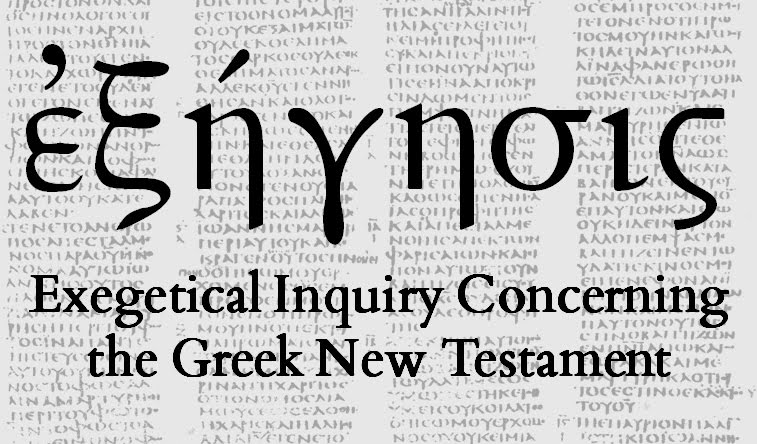The following is from Credo blog.
To start off this week we would like to highlight the ETS paper of A. B. Caneday, who is also a weekly contributor to the Credo blog as well as a contributor to the January issue of Credo Magazine, “In Christ Alone.” Caneday’s paper is titled: “The Advent of God’s Son as Judgment in John’s Gospel-Justification and Condemnation Already.” Ardel Caneday (Ph.D., Trinity Evangelical Divinity School) is Professor of New Testament Studies and Biblical Studies at Northwestern College in St. Paul, Minnesota. He has served churches in various pastoral roles, including senior pastor. He has authored numerous journal articles, many essays in books, and has co-authored with Thomas Schreiner the book The Race Set Before Us: A Biblical Theology of Perseverance and Assurance (Inter-Varsity, 2001).
Caneday begins his paper:
Despite mistakenly construing John’s Gospel against the backdrop of second-century Gnosticism, skewing his interpretation of the Gospel, Rudolf Bultmann correctly identifies divine judgment as an important aspect of Johannine theology. He observes that Jesus’ activity as “Revealer of God,” whose unitary advent (John 3:19; 9:39) and departure (12:31), is the eschatological event, “the judgment of the world.” According to Bultmann, Jesus’ coming cast the whole κόσμος into κρίσις. Yet, this eschatological judgment “is no dramatic cosmic event, but takes place in the response of men to the word of Jesus.” He contends, “Thus the judgement is not a specially contrived sequel to the coming and the departure of the Son. It is not a dramatic cosmic event which is yet to come and which we must still await. Rather the mission of the Son, complete as it is in his descent and exaltation, is the judgement.”
Despite holding significant disagreements with Bultmann, New Testament exegetes do not miss the fact that divine judgment figures prominently in John’s Gospel. So, for example, Köstenberger observes, “in an important sense, God’s judgment was already brought about by the light’s coming into the world in the incarnation of the Son (1:14). This coming of the light into the world, in turn, confronts people everywhere with the decision of whether to embrace the light or to go into hiding and persist in darkness.” All who reject God’s Son incur divine judgment, but all who believe in him “escape judgment already in the here and now (5:24), though the final judgment awaits the end of time (5:28-29).”
True as this is, arguments to counter or to qualify Bultmann’s insistence that John’s Gospel contends for a “realized eschatology” versus the traditional Jewish end-time eschatology tend to overlook important ramifications of the Last Day’s advance arrival with the advent of the Son of God. The exclusive claim of Peter’s proclamation that “there is no other name under heaven given among mortals by which we must be saved” (Acts 4:12) finds expanded expression in the Fourth Gospel.
For God so loved the world, that he gave his only Son, that whoever believes in him should not perish but have eternal life. For God did not send his Son into the world to condemn the world, but in order that the world might be saved through him. Whoever believes in him is not condemned, but whoever does not believe is condemned already, because he has not believed in the name of the only Son of God. And this is the judgment: the light has come into the world, and people loved darkness rather than light because their works were evil.
The life of the Age to Come is resident in and mediated through God’s Son, Jesus Christ. Hence, eternal life, which properly belongs to the coming age, is already present with the incarnation of the Word and is now being imparted to all who believe in God’s Son. Noteworthy as is the advance installment of eternal life, signaling resurrection’s encroachment into the present age, of equal significance is the announcement beforehand of God’s Last Day verdict of judgment, all who believe “are not condemned,” but whoever does not believe “is condemned already.”
With his advent, God’s Son already brings forward two correlated acts of God—resurrection and judgment—that belong to the Last Day which consummates the present age and ushers in the Age to Come. The mission of God’s incarnate Son sweeps forward both the wrath of God’s coming judgment now revealed in Christ’s sacrificial death and the gift of God’s resurrection life disclosed in Christ’s glorious resurrection from the dead. Because Jesus is the incarnate Son of God, the Father authorized him to have “life in himself” to bestow this life of the coming age to whomever he desires in advance of the day of resurrection and to set in motion execution of the coming judgment upon both those who believe and those who do not (John 3:16-19; 5:21-29). Johannine scholars affirm these emphases. Yet, lacking within discussions of the Fourth Gospel’s emphasis upon the present arrival of future resurrection and judgment in the person of Jesus Christ is development of John’s doctrine of justification, expressed with neither the verb δικαιόω nor the noun δικαίωσις but through less direct but no less emphatic expressions. In these expressions the affirmative is emphatically stated by negating its opposite so that “are not condemned” and “do not come into condemnation” bear the sense, “most assuredly justified.”
